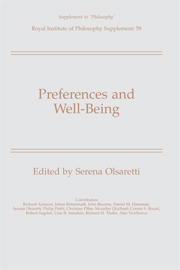
- Cited by 7
-
Cited byCrossref Citations
This Book has been cited by the following publications. This list is generated based on data provided by Crossref.
Broome, John 2009. Against Injustice. p. 161.
Ransome, Bill 2010. Sen and Aristotle on Wellbeing. Australian Journal of Social Issues, Vol. 45, Issue. 1, p. 41.
Rüther, Markus 2016. Lebensqualität in der Medizin. p. 27.
Dold, Malte F. 2018. Back to Buchanan? Explorations of welfare and subjectivism in behavioral economics. Journal of Economic Methodology, Vol. 25, Issue. 2, p. 160.
Miller, David and Straehle, Christine 2019. The Political Philosophy of Refuge.
Ferreira, João V. 2023. Which choices merit deference? A comparison of three behavioural proxies of subjective welfare. Economics and Philosophy, Vol. 39, Issue. 1, p. 124.
Roland Azibo, Balgah and Louis Sonkey, Ntu 2024. Infrastructure development and community wellbeing in sub-Saharan Africa: A structural equation modeling – based contribution from Cameroon. Community Development, Vol. 55, Issue. 5, p. 623.
- Publisher:
- Cambridge University Press
- Online publication date:
- May 2010
- Print publication year:
- 2006
- Online ISBN:
- 9780511599743


